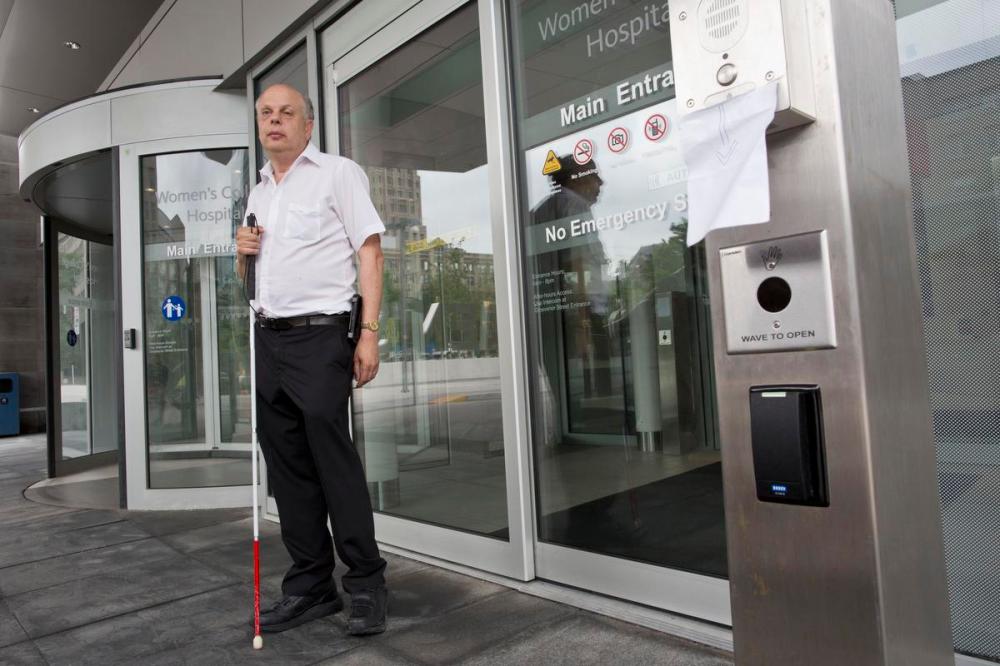Manitoba window of opportunity open to boost accessibility standards: advocate
Advertisement
Read this article for free:
or
Already have an account? Log in here »
To continue reading, please subscribe:
Monthly Digital Subscription
$0 for the first 4 weeks*
- Enjoy unlimited reading on winnipegfreepress.com
- Read the E-Edition, our digital replica newspaper
- Access News Break, our award-winning app
- Play interactive puzzles
*No charge for 4 weeks then price increases to the regular rate of $19.00 plus GST every four weeks. Offer available to new and qualified returning subscribers only. Cancel any time.
Monthly Digital Subscription
$4.75/week*
- Enjoy unlimited reading on winnipegfreepress.com
- Read the E-Edition, our digital replica newspaper
- Access News Break, our award-winning app
- Play interactive puzzles
*Billed as $19 plus GST every four weeks. Cancel any time.
To continue reading, please subscribe:
Add Free Press access to your Brandon Sun subscription for only an additional
$1 for the first 4 weeks*
*Your next subscription payment will increase by $1.00 and you will be charged $16.99 plus GST for four weeks. After four weeks, your payment will increase to $23.99 plus GST every four weeks.
Read unlimited articles for free today:
or
Already have an account? Log in here »
Hey there, time traveller!
This article was published 09/01/2024 (696 days ago), so information in it may no longer be current.
Manitoba is in a “sweet spot” to advance accessibility standards and the time for action is now, says a leading disability rights advocate and constitutional law expert.
David Lepofsky is a member of the Order of Canada and Order of Ontario, and an adjunct law professor at Western University (London, Ont.). He was in Winnipeg this week to speak to advocates, the public and University of Manitoba law students about the future of accessibility in the province.
“These are always uphill fights, but our capacity to fight them is substantially improved,” the retired lawyer said in an interview Tuesday, following his Jan. 8 talk at the Canadian Museum for Human Rights, through Barrier-Free Manitoba.

Lepofsky, who is blind, was one of the advocates who became a driving force behind enshrining disability rights in the Canadian Charter of Rights and Freedoms.
Focusing on progress and a few key priorities for supporting people with disabilities in schools and as patients in the health-care system, the chairman of AODA Alliance (an advocacy group instrumental in making accessibility standards a reality in Ontario) shared a hopeful perspective for Manitoba.
There is a window of opportunity, Lepofsky said, urging advocates to throw it open because provincial accessibility legislation “has got the key ingredients” and just needs a few tweaks, consistent enforcement and political will.
Lobbying a new (NDP) government early in its first term could be the key to fully implement accessibility standards and create new standards for accessibility in education, health care and housing, he added. “That could make a huge difference.”
Also, he said, Manitobans don’t have to start from scratch.
It took nearly 10 years of advocacy work before the Accessibility for Ontarians with Disabilities Act became law in 2005.
Following that example, Manitoba became the second province to enact accessibility standards. Such legislation has now been brought into effect in five provinces, as well as federally.
When beginning his advocacy began in Ontario some 40 years, Lepofsky said he first had to get the disability community on board, never mind governments. Now, accessibility standards are not politically controversial.
“So the question is not, do we deserve it, but are they keeping the commitments that the legislatures made? And that is a seismic shift.”
Still, there are daily battles for accessibility, Lepofsky said.
The Winnipeg hotel he stayed at had braille on the doors, allowing him to find his room number, but the elevator was not equipped with voice announcements, meaning Lepofsky couldn’t tell which floor he was on.
Barrier-Free Manitoba invited Lepofsky to speak at a time when local advocates are looking at the bigger picture of accessibility, while still having to fight for access to appropriate mobility devices through the province’s wheelchair services program.
“That’s the problem. We’re spending all of our time and all of our energy fighting for the basics,” said David Kron, executive director of the Cerebral Palsy Association of Manitoba and a steering committee member of Barrier-Free Manitoba.
“The resources have to be there, and we’re ready to demand our human rights. That’s what it comes down to.”
After years of advocacy, the Ontario government agreed in 2021 to develop standards for accessible education and health care, which still need to be implemented.
That needs to be a priority in Manitoba, too, Lepofsky said, as does pulling people with disabilities out of poverty.
“We know that people with disabilities already face excessively high unemployment rates compared to the general public, so we’ve got to tackle that. And we know how to do it. It’s not like this wheel has to be invented,” he said.
Starting in schools and making a good education accessible to more people with disabilities, Lepofsky said, “will create a whole new generation with a different outlook.”
katie.may@freepress.mb.ca

Katie May is a multimedia producer for the Free Press.
Our newsroom depends on a growing audience of readers to power our journalism. If you are not a paid reader, please consider becoming a subscriber.
Our newsroom depends on its audience of readers to power our journalism. Thank you for your support.





